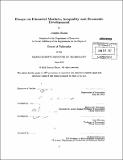Essays on financial markets, inequality and economic development
Author(s)
Blaum, Joaquin
DownloadFull printable version (8.298Mb)
Other Contributors
Massachusetts Institute of Technology. Dept. of Economics.
Advisor
Robert M. Townsend and Iván Werning.
Terms of use
Metadata
Show full item recordAbstract
In Chapter 1, I study the effects of wealth inequality on economies where financial markets are imperfect. I exploit the idea that inequality should have a different effect across sectors. Using a difference-in-difference strategy, I show that sectors that are more in need of external finance are relatively smaller in countries with higher income inequality. I then build a model in which sectors differ in their fixed cost requirement, agents face collateral constraints, and production is subject to decreasing returns. A calibrated version of the model is consistent with the documented facts on inequality and cross-sector outcomes. At the calibrated parameters, wealth inequality exacerbates the effect of financial frictions on the economy. Quantitatively, wealth inequality can generate losses of up to 46 percent of per capita income. In Chapter 2, co-authored with Claire Lelarge and Michael Peters, we explore the ingredients that a model of import behavior should have in order to be consistent with the firm level evidence. We build a model where firms are heterogeneous in their factor neutral productivity, and prices, fixed costs and input qualities are common across firms. Using a comprehensive dataset of French firms, we test the qualitative predictions of such model. The model fares well in describing firm's expenditure across imported varieties, but fails to account for the pattern of expenditure between domestic and foreign inputs. We conclude that a mechanism inducing firm-level heterogeneity in the relative price of domestic varieties is needed to model import demand. In Chapter 3, I study the effects of financial frictions on the pattern of cross-industry growth rates. I document two facts: (i) externally dependent sectors tend to grow faster along the economy's development path, and (ii) externally dependent sectors grow disproportionately faster in countries with better financial institutions. I argue that financial frictions can account for these facts. I build a dynamic two-sector model in which sectors differ in their liquidity requirement and agents face collateral constraints. Financial frictions generate faster growth in the sector with higher liquidity requirement. I identify conditions under which financial development leads to higher excess growth in the externally dependent sector.
Description
Thesis (Ph. D.)--Massachusetts Institute of Technology, Dept. of Economics, 2012. Cataloged from PDF version of thesis. Includes bibliographical references (p. 123-128).
Date issued
2012Department
Massachusetts Institute of Technology. Department of EconomicsPublisher
Massachusetts Institute of Technology
Keywords
Economics.